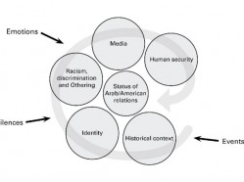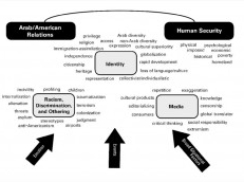This body of work explores Arab/American relations, intercultural relations, political narrative, narrative inquiry, human security, emotion, political racism, discrimination, othering, identity, forgiveness, voice and restitution.
Phase One (2009-2010) of this project explored women’s views and experiences with Arab/American relations, post-9/11. Three groups of women were involved: Arab women in Qatar, Arab American women in the U.S., and non-Arab women in the U.S. and focused on interconnected themes of identity, racism, discrimination and Othering, the role of the media, and how these ultimately influence a collective sense of human security. The project used narrative inquiry to understand meaning-making during times of turmoil by exploring women’s sense of belonging in the political world and women’s voices during the post-9/11 period.
Phase Two of this project is aimed at making the findings of earlier work more accessible to a broader audience while also furthering this inquiry into Arab/American relations. We will deepen themes from Phase One in order to create a picture over time of the shifts in Arab/American relations from 2010 to the present.
A range of themes emerged from the narratives and these were all influenced by current “events” that occurred over the approximate timeframe of the project such as the shooting at Fort Hood and the abuse at Abu Ghraib prison.
The narrative data was scanned for ‘emotions’ and the above graphic depicts some of the emotions uncovered by group.
The project provides a snapshot in time of the status of Arab/American relations.
Influencers
Nadine Naber’s extensive work on Arab-American issues informed some of the questions I asked in this study.
Joan Didion’s essay written in 2003 gives a unique and critiquing perspective and provides another snapshot in time post 9/11.
Molly Andrews gives us clear and inspired political narrative methodologies. Her work provides a working framework for our own applied research.
The earliest inspiration for this project traces back to the work during WWII of Newton E. Moats who, as a Methodist minister on the West Coast of the U.S., took a human rights stand during the time of internment of U.S. citizens of Japanese descent. His work sparked a longstanding interest in relations between races in America and the context and complexities of the narratives that envelop us all.

